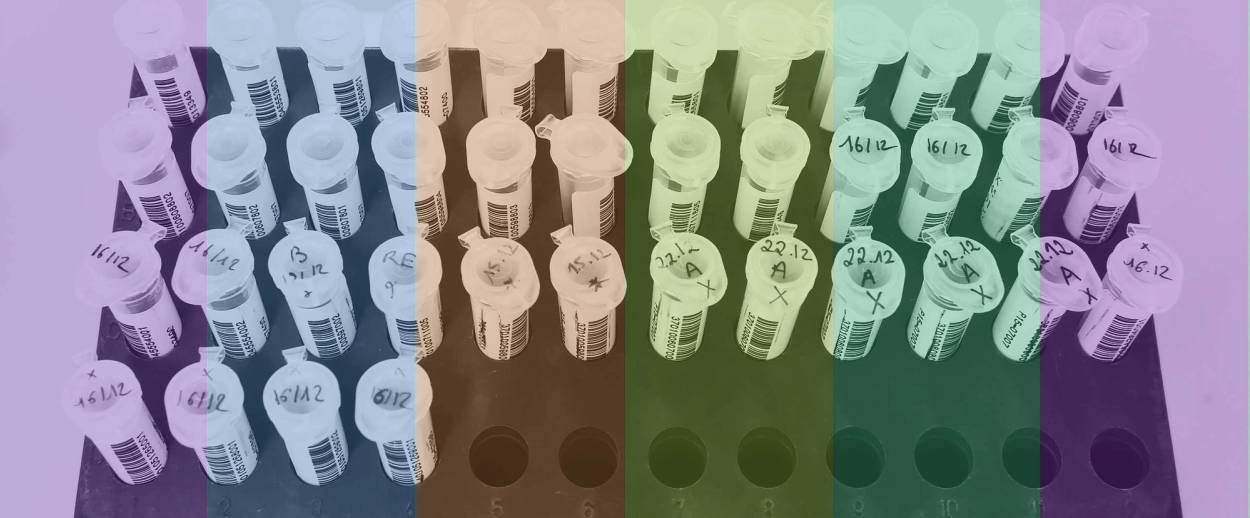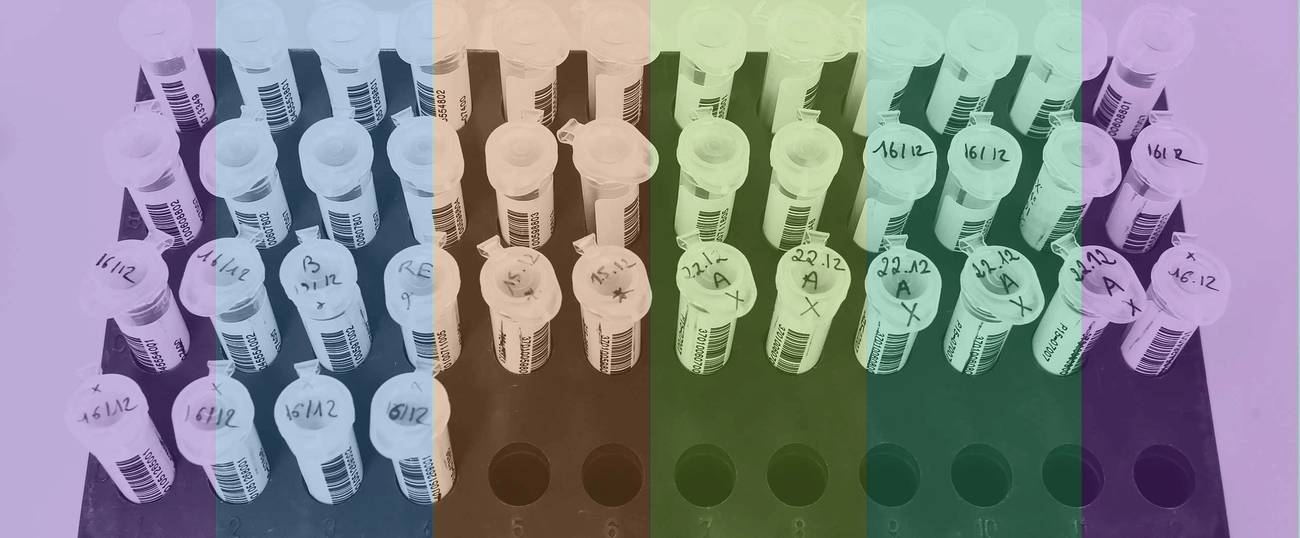More Than Tay-Sachs
One rabbi’s mission to push couples—and doctors—to screen for a longer list of genetic diseases




The Jewish community’s response to Tay-Sachs may be a public health success story, and yet it has led to little standardization in carrier screening, even among Jews. The genetic testing guidelines from the major professional organizations vary considerably from the testing recommended in metropolitan areas with large concentrations of Jews. The American College of Obstetricians and Gynecologists (ACOG) recommends that Ashkenazi Jews be screened for Tay-Sachs disease, Canavan disease, cystic fibrosis, and familial dysautonomia, and the American College of Medical Genetics and Genomics (ACMG) adds five more diseases. But labs that focus on Jewish genetic diseases screen for about nineteen disorders and as many as thirty-eight, with the number continuing to rise.
Peter Kasdan is trying to change that through sheer strength of will. In his first pulpit after he graduated from rabbinical school, Kasdan taught a high school girl with Gaucher disease. “She was always sick,” he says. “We always worried about her.” As a clergyman, Kasdan knew better than most about comforting the sick. What he didn’t know at that time was that having a child with Gaucher—and other diseases that disproportionately affect Jews, leading Kasdan to bury eight of his students over the course of his career—could be avoided. He learned that several years later, in 1975, at the national convention of the Central Conference of American Rabbis, the professional organization for Reform rabbis in North America. During the conference, a resolution was passed to “urge those couples seeking their officiating at marriage ceremonies to undergo screening for Tay-Sachs and other genetic diseases which afflict Jews to a significant degree.”
Kasdan was then in his fourth year as spiritual leader of the Reform congregation Temple Emanu-El in Livingston, New Jersey. A self-described type A personality, he took the resolution to heart—and went a giant step further. When couples would ask him to perform their wedding ceremony, he decided he wouldn’t just encourage them to get tested to see if they were carriers for the genetic diseases that strike Jews more often than the general population. His approach was: “I’m not going to urge them. I’m going to tell them: ‘You want me to do your wedding? Get tested.’ ”
I don’t know of other rabbis who refuse to officiate at a marriage if a couple rejects testing, but Kasdan’s success rate is impressive. He retired in 2001 as Rabbi Emeritus. Now seventy-five, he has officiated at more than 1,000 weddings. Only two couples declined testing; Kasdan, in turn, declined to marry them. If couples who get tested learn they’re both carriers for the same disease, Kasdan, along with a genetic counselor, helps them work through the issues. “The genetic counselor deals with the science of it and I deal with the spirituality of it,” he says.
The options, as he sees them: decide not to have kids; choose to adopt; create embryos in a fertility clinic and discard those that have the disease; or get pregnant the regular way, test the fetus, and abort if disease is confirmed. Some couples, he acknowledges, may decide to continue an affected pregnancy. “I have couples who have said to me that it’s God’s will,” he says. “I believe that God has given human beings free will. I would never attribute blame to God if parents knowingly give birth to a child with a fatal Jewish genetic disease. Do they really have the right to give birth to a child whose body will self-destruct? To me, it’s a moral issue. But ultimately that will not stop me from standing under the chuppah with them.”
Kasdan’s maverick, unwavering determination that couples seek genetic testing before they marry (and presumably before they start thinking about having children) has contributed to a significant shift in thinking about the burden of inherited disease. Kasdan hopes to confer the same public awareness that Tay-Sachs has achieved within the Jewish community on the other genetic diseases—including Canavan disease, which killed two of his tiny congregants at ages two and four—that disproportionately affect Ashkenazi Jews. (At least a dozen diseases are more likely to occur in the Sephardic population of Jews who are descended from Spain and from Arab countries, although disease prevalence varies widely by country of origin. Because the U.S. Jewish population skews heavily Ashkenazi, the diseases affecting the Sephardic community have lagged even further behind in the public consciousness.) He is fighting no less powerful an entity than ACOG, the professional organization for the nation’s more than 30,000 ob-gyns, which has historically supported carrier screening primarily for diseases whose impact is severe and first observed early in life. While a disease such as Tay-Sachs certainly meets that standard, that’s not always the case, as Michael Kaback has noted, for a disease such as Gaucher.
To build his case and educate doctors about the importance of expanding testing, Kasdan, rabbinic advisor to the Jewish Genetic Disease Consortium, leads a medical Grand Rounds program in which geneticists and genetic counselors travel to hospitals to teach obstetricians and pediatricians about hereditary Jewish genetic diseases. He also addresses graduating classes of rabbinical students of all denominations, Reform through Orthodox, advising these freshly minted rabbis to make it a priority to connect with a local genetic counselor wherever they land their first congregation. He delivers his spiel about the importance of catching hereditary disease before it takes its toll on yet another generation and asks if anyone has any questions. Then he lowers the boom: “Now that you know about this,” he says, channeling the gravitas of a man who has done for decades the job they’re about to embark upon, “if you choose not to advise couples to get tested and then they have a baby with one of these diseases and they choose to sue you, guess who will testify against you as an expert witness?” Kasdan intones this for the shock value, but he says he is fully committed to what he realizes is a “very radical” idea. “If I should ever come across a couple who reaches out to me after they give birth to a baby with one of these diseases and their rabbi did not tell them to get tested, I would suggest they hire an attorney,” says Kasdan. “I have no patience for rabbis or doctors who know the reality and don’t do anything about it.”
While Kasdan is not advocating that a couple who learns they are both carriers scuttle their impending marriage, Dor Yeshorim, an organization that was founded by an Orthodox rabbi who lost several children to Tay-Sachs, is recommending that they think twice. Dor Yeshorim, based in New York City, maintains an anonymous database of genetic testing results. Potential mates—mostly Orthodox Jews—reference the database for what Dor Yeshorim calls a “compatibility check,” preferably before “a couple or the parents meet, to avoid unnecessary heartache!” If they’re found to both be carriers for the same disease, they are “informed that the match is incompatible.” Those couples insistent on pursuing a relationship are offered genetic counseling.
Comprehensive awareness of multiple genetic diseases is slow to trickle down in the States. Not so in Israel, which is a petri dish for Jewish genetic testing. Israel’s Ministry of Health continually assesses which new diseases to add to its testing panel; its most recent recommendation lists dozens of diseases according to place of family origin. Jews from Iraq, for example, share some disease risk with Jews from Iran, which overlaps in part with disease risk for Jews from Morocco. In contrast, the United States has no governmental agency devoted to this endeavor. Israel covers prenatal genetic testing for all citizens, including Arab citizens—who are at risk for some of the same diseases as their Jewish neighbors and for some different ones—and strongly advises that testing take place before pregnancy. As a result, most couples heed that advice. Just as conscientious young women in the United States begin taking prenatal vitamins in preparation for pregnancy, Israeli women include getting a vial of blood drawn on their to-do list.
Testing before pregnancy can alleviate much heartache and allow for a broader range of options. When Arthur Beaudet, a Baylor College of Medicine geneticist, spoke in 2014 at the widely respected Future of Genomic Medicine conference in La Jolla, California, he told the audience that the time to do carrier screening is before conception. Knowing that many of the inherited diseases result in agonizing deterioration and death in childhood, while others cause debilitating pain, some people would likely change their childbearing plans. The point is that waiting until pregnancy to do carrier screening, if it’s even done at all, is too late. “We really need to educate that screening is something you want to do prior to conception,” says Beaudet. “From a public health standpoint, we would like everyone to give birth to healthy children and avoid the birth of children with severe disabilities. If we want to do that to the max, we have to identify inherited risks.”
So why hasn’t the mainstream U.S. medical infrastructure embraced this framework of pre- pregnancy testing? For one thing, it’s expensive for insurance providers to screen every woman of childbearing age, particularly when carrier screening is not yet part of the public consciousness. For another, many women in the United States—about half, in fact—get pregnant accidentally, which bypasses any opportunity for advance screening. For those whose pregnancies are planned, most make a trip to the doctor’s office only after a pregnancy test turns up positive. Even then, many obstetricians—very few of whom have training in genetics—don’t emphasize the importance of carrier screening or fully understand which diseases their patients should be screened for.
The advent of sequencing technologies is starting to change whether and how people are screened for genetic disease. From a financial perspective, it’s increasingly possible to screen individuals for dozens of diseases for the same price, more or less, as the cost of looking for mutations in a single gene or handful of genes. With intermarriage and mixed-race couples increasingly common—broadening the array of diseases that can potentially be passed on to future generations—carrier screening for all seems like a good idea.
After all, in the multicultural world in which we live, ethnicity is no longer the black-or-white paradigm it once was. Bloodlines get muddled into a genetic melting pot in a society in which Asians marry blacks and WASPs marry Jews. “To rely on patients’ understanding of their ethnicity and make judgments based on patients’ ethnicity is limiting in terms of screening for diseases,” says Nancy Rose, a geneticist and maternal-fetal medicine physician at the University of Utah Health Sciences Center and at Intermountain Healthcare, who formerly chaired the Committee on Genetics for ACOG.
Excerpted by permission from The Gene Machine: How Genetic Technologies Are Changing the Way We Have Kids—And the Kids We Have, Copyright © 2017 by Bonnie Rochman, published by Scientific American/Farrar, Straus and Giroux.
***
Like this article? Sign up for our Daily Digest to get Tablet Magazine’s new content in your inbox each morning.
Bonnie Rochman is a former health and parenting columnist for Time.com who has written for The New York Times Magazine, The Wall Street Journal, and Scientific American.